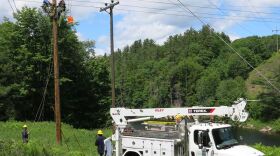A windfall of federal money is opening up doors for internet access in rural areas. The pandemic exposed existing inequities that kept those without reliable broadband from telehealth, remote school and work. In Bristol and Grafton County, broadband expansion is in the works.
All Things Considered host Peter Biello spoke with Nik Coates, the Bristol town administrator, about the plans the town has for expanding broadband and what it could mean for the future. Below is a transcript of their conversation.
Peter Biello: This is All Things Considered on NHPR. I'm Peter Biello. Millions of federal dollars are being disbursed throughout the Granite State to expand access to broadband. The pandemic laid bare the need for internet access in rural areas.
The town of Bristol in Grafton County received $1.6 million from the CARES Act last year and is poised to get more than $300,000 more through the American Rescue Plan. It's putting that funding toward providing more equitable internet access in the community. Nik Coates is the Bristol town administrator. Nik, thank you for speaking with me.
Nik Coates: I appreciate it, Peter. Thank you.
Peter Biello: So, give us a sense of what broadband access looks like in Bristol right now.
Nik Coates: So, broadband access in Bristol is uneven, like many communities, especially smaller communities where there is essentially one provider, that's the cable company and the cable company provides service on coaxial cable. So it's not the fastest. It's not the slowest, I mean, it's certainly not satellite, but it is not the speed in which we want to be able to grow high-tech businesses here, provide stable, reliable internet for schooling, for remote working. So, before the pandemic, we were thinking a lot about the importance of telehealth and the importance of telework and remote schooling and the pandemic sort of accentuated that.
And so right now, we have a provider in town, the cable company, and what we identified is that there is slow service or, in some places, there's really no service. And that puts us behind the eight ball in terms of how we operate as the community and our schools operate.
Peter Biello: So expansion has to do with both making the lines you have faster and extending lines to places that don't have those lines yet.
Nik Coates: That's right. So, the projects that we've brought in, we've built out a new system which is really focused on trying to connect all of our municipal buildings and one aspect of it back to the university system and received internet service through the university system, which we can then connect into the schools, which allows the schools to be able to plug into advanced research at those universities, as well as MIT and the University of Vermont and as well as the municipality. And then the other piece of it is a private network that's going to be managed by a private provider. That's going to be a much higher speed and a lot more stable for people who need better internet at home for all the various reasons, such as health, schooling and homework, so there's the multifaceted component. We really essentially rebuilt the system here in Bristol to meet our needs to be able to control our destiny as a community.
Peter Biello: So, the town of Bristol is receiving quite a bit of money from the federal government through various channels. How big a deal is this money? What's it going to make possible?
Nik Coates: It's going to completely improve our regional economy. So, what we realized very early on, even before all this pandemic was happening, is, so we have to have an international manufacturing plant here in town. We also have some regional businesses and we have some smaller businesses. And what we realized is that one of the greatest weaknesses that they all have is the ability to have good internet speeds and good, stable internet connections. What we believe is going to happen is this is going to allow the larger company here in town to be able to expand their operations and to stay strong and to stay with us.
It's going to allow some of those smaller type [of] businesses to really grow and expand and get to market a lot easier, a lot faster. And it's also going to level the playing field for our kids. Like many communities in the state as well, what's really important about this internet system is the telehealth aspect. We have a lot of folks who are trying to recover from different addiction issues or mental health services. And you can't provide telehealth if you don't have a decent internet connection. We have a health care provider here in town that's focused really on providing that level of service. But they weren't able to deliver that level of service because the internet connections at those homes did not exist. So, being able to have people who have these internet connections, they can now access mental health services, addiction treatment, regular routine doctor's appointments that they may not necessarily.
So for us, it's both an economic improvement as a community and being able to help us grow our tax base, but then also to really have the best quality of life so that people can live here and can access the health care and access all the different things that they need to be able to access.
Peter Biello: You said that this is not just a thing that'll help Bristol's economy, but the regional economy. What do you think other towns can learn from your experience with getting this federal money and deploying it in the service of expanding broadband?
Nik Coates: Well, the good news is that a lot of these communities are going to get to learn the things that we bang our head against the wall on for three years around. Things like, 'how do you how do you build it? So who do you need to build it? What does it need to look like? Where should it go? What sorts of decisions do you need to make around that? Things like insurance, you know, how do you insure something like this? To things like how do you work with the pole owners to ensure that you can build a system on somebody else's poles, to really kind of understanding what is it the needs of the community are.
So, what we hope is that with all the things that we did wrong for the first couple of years and figured out how to do it right, we can now move forward and help those communities have a model so that they can do it a lot easier and a lot faster. And what's really important is that we're all tied together. Bristol's economy isn't tied to just how Bristol does its job and does its work. But Bristol could also, more importantly, succeed in working with partners in neighboring communities and the county, because if we can lift up the county and do this across the entire county, it's going to make the county a lot more viable.
Not to sort of wax poetic, but I grew up in New Hampshire, and there was always this discussion about how do we improve the North Country? How do we lift the North Country up? How do we help the North Country get back on its feet? And I really believe that this is the best way to do this, is that the county can be the most-connected county in the country, which is going to set it apart from other places, because what people are looking for now is the ability to be able to get on this internet system and have fast internet and be able to do all the things that they need to do. But they also want the quality of life, of being able to hike in the mountains and bike on the trails and having good schools. What I think this is going to be able to do, by us helping show the way, is that other communities are going to be able to do it for itself. And then we're going to have a vibrant county, which is going to really put us on the map.
Peter Biello: Nik Coates is the town administrator for Bristol. Thank you very much for speaking with me.
Nik Coates: I appreciate it. Thank you.









